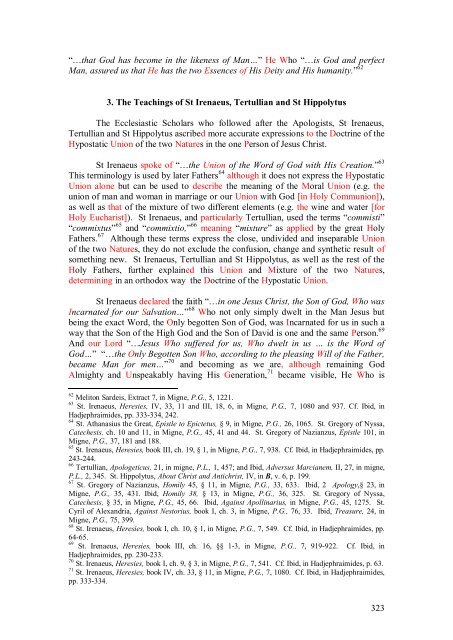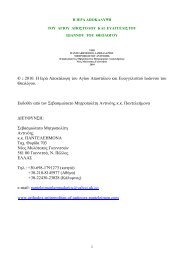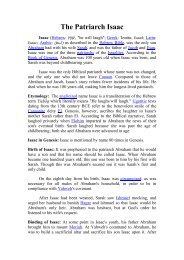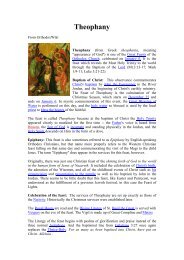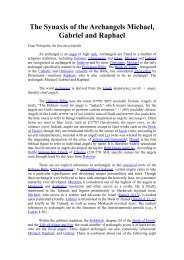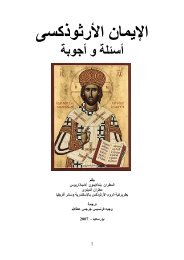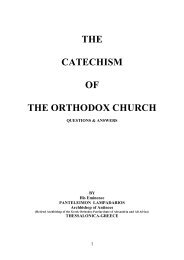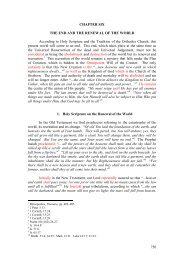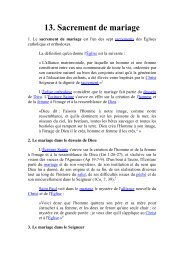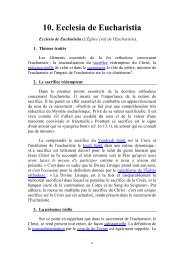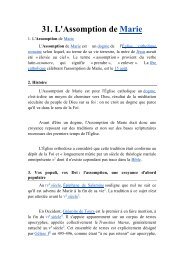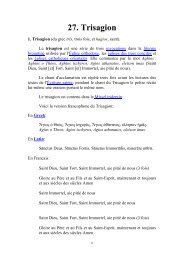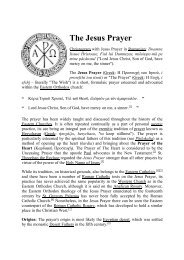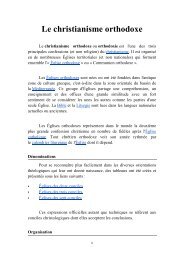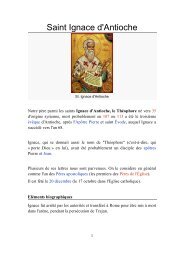028 part 3 chapter 6 the hypostatic union - Orthodox-mitropolitan-of ...
028 part 3 chapter 6 the hypostatic union - Orthodox-mitropolitan-of ...
028 part 3 chapter 6 the hypostatic union - Orthodox-mitropolitan-of ...
Create successful ePaper yourself
Turn your PDF publications into a flip-book with our unique Google optimized e-Paper software.
“…that God has become in <strong>the</strong> likeness <strong>of</strong> Man…” He Who “…is God and perfect<br />
Man, assured us that He has <strong>the</strong> two Essences <strong>of</strong> His Deity and His humanity.” 62<br />
3. The Teachings <strong>of</strong> St Irenaeus, Tertullian and St Hippolytus<br />
The Ecclesiastic Scholars who followed after <strong>the</strong> Apologists, St Irenaeus,<br />
Tertullian and St Hippolytus ascribed more accurate expressions to <strong>the</strong> Doctrine <strong>of</strong> <strong>the</strong><br />
Hypostatic Union <strong>of</strong> <strong>the</strong> two Natures in <strong>the</strong> one Person <strong>of</strong> Jesus Christ.<br />
St Irenaeus spoke <strong>of</strong> “…<strong>the</strong> Union <strong>of</strong> <strong>the</strong> Word <strong>of</strong> God with His Creation.” 63<br />
This terminology is used by later Fa<strong>the</strong>rs 64 although it does not express <strong>the</strong> Hypostatic<br />
Union alone but can be used to describe <strong>the</strong> meaning <strong>of</strong> <strong>the</strong> Moral Union (e.g. <strong>the</strong><br />
<strong>union</strong> <strong>of</strong> man and woman in marriage or our Union with God [in Holy Comm<strong>union</strong>]),<br />
as well as that <strong>of</strong> <strong>the</strong> mixture <strong>of</strong> two different elements (e.g. <strong>the</strong> wine and water [for<br />
Holy Eucharist]). St Irenaeus, and <strong>part</strong>icularly Tertullian, used <strong>the</strong> terms “commisti”<br />
“commixtus” 65 and “commixtio,” 66 meaning “mixture” as applied by <strong>the</strong> great Holy<br />
Fa<strong>the</strong>rs. 67 Although <strong>the</strong>se terms express <strong>the</strong> close, undivided and inseparable Union<br />
<strong>of</strong> <strong>the</strong> two Natures, <strong>the</strong>y do not exclude <strong>the</strong> confusion, change and syn<strong>the</strong>tic result <strong>of</strong><br />
something new. St Irenaeus, Tertullian and St Hippolytus, as well as <strong>the</strong> rest <strong>of</strong> <strong>the</strong><br />
Holy Fa<strong>the</strong>rs, fur<strong>the</strong>r explained this Union and Mixture <strong>of</strong> <strong>the</strong> two Natures,<br />
determining in an orthodox way <strong>the</strong> Doctrine <strong>of</strong> <strong>the</strong> Hypostatic Union.<br />
St Irenaeus declared <strong>the</strong> faith “…in one Jesus Christ, <strong>the</strong> Son <strong>of</strong> God, Who was<br />
Incarnated for our Salvation…” 68 Who not only simply dwelt in <strong>the</strong> Man Jesus but<br />
being <strong>the</strong> exact Word, <strong>the</strong> Only begotten Son <strong>of</strong> God, was Incarnated for us in such a<br />
way that <strong>the</strong> Son <strong>of</strong> <strong>the</strong> High God and <strong>the</strong> Son <strong>of</strong> David is one and <strong>the</strong> same Person. 69<br />
And our Lord “…Jesus Who suffered for us, Who dwelt in us … is <strong>the</strong> Word <strong>of</strong><br />
God…” “…<strong>the</strong> Only Begotten Son Who, according to <strong>the</strong> pleasing Will <strong>of</strong> <strong>the</strong> Fa<strong>the</strong>r,<br />
became Man for men…” 70 and becoming as we are, although remaining God<br />
Almighty and Unspeakably having His Generation, 71 became visible, He Who is<br />
62 Meliton Sardeis, Extract 7, in Migne, P.G., 5, 1221.<br />
63 St. Irenaeus, Heresies, IV, 33, 11 and III, 18, 6, in Migne, P.G., 7, 1080 and 937. Cf. Ibid, in<br />
Hadjephraimides, pp. 333-334, 242.<br />
64 St. Athanasius <strong>the</strong> Great, Epistle to Epictetus, § 9, in Migne, P.G., 26, 1065. St. Gregory <strong>of</strong> Nyssa,<br />
Catechesis, ch. 10 and 11, in Migne, P.G., 45, 41 and 44. St. Gregory <strong>of</strong> Nazianzus, Epistle 101, in<br />
Migne, P.G., 37, 181 and 188.<br />
65 St. Irenaeus, Heresies, book III, ch. 19, § 1, in Migne, P.G., 7, 938. Cf. Ibid, in Hadjephraimides, pp.<br />
243-244.<br />
66 Tertullian, Apologeticus, 21, in migne, P.L., 1, 457; and Ibid, Adversus Marcianem, II, 27, in migne,<br />
P.L., 2, 345. St. Hippolytus, About Christ and Antichrist, IV, in B, v. 6, p. 199.<br />
67 St. Gregory <strong>of</strong> Nazianzus, Homily 45, § 11, in Migne, P.G., 33, 633. Ibid, 2 Apology,§ 23, in<br />
Migne, P.G., 35, 431. Ibid, Homily 38, § 13, in Migne, P.G., 36, 325. St. Gregory <strong>of</strong> Nyssa,<br />
Catechesis, § 35, in Migne, P.G., 45, 66. Ibid, Against Apollinarius, in Migne, P.G., 45, 1275. St.<br />
Cyril <strong>of</strong> Alexandria, Against Nestorius, book I, ch. 3, in Migne, P.G., 76, 33. Ibid, Treasure, 24, in<br />
Migne, P.G., 75, 399.<br />
68 St. Irenaeus, Heresies, book I, ch. 10, § 1, in Migne, P.G., 7, 549. Cf. Ibid, in Hadjephraimides, pp.<br />
64-65.<br />
69 St. Irenaeus, Heresies, book III, ch. 16, §§ 1-3, in Migne, P.G., 7, 919-922. Cf. Ibid, in<br />
Hadjephraimides, pp. 230-233.<br />
70 St. Irenaeus, Heresies, book I, ch. 9, § 3, in Migne, P.G., 7, 541. Cf. Ibid, in Hadjephraimides, p. 63.<br />
71 St. Irenaeus, Heresies, book IV, ch. 33, § 11, in Migne, P.G., 7, 1080. Cf. Ibid, in Hadjephraimides,<br />
pp. 333-334.<br />
323


